
"You're Breakin' My Heart" is a song by American singer-songwriter Harry Nilsson, appearing on his 1972 album Son of Schmilsson . It is notorious for the opening line, "You're breakin' my heart / You're tearin' it apart / So fuck you". [1]

"You're Breakin' My Heart" is a song by American singer-songwriter Harry Nilsson, appearing on his 1972 album Son of Schmilsson . It is notorious for the opening line, "You're breakin' my heart / You're tearin' it apart / So fuck you". [1]
The song was written by Nilsson about the then-recent separation from his wife Diane; the lyrics contain self-blame for the break-up, as well as several unpleasant diatribes towards his former partner. Biographer Alyn Shipton speculated that at least one line was a coded reference to Nilsson's relationship with his close friend Ringo Starr. [2]
During recording, Nilsson had begun to drink heavily and started to record more experimental and controversial material; producer Richard Perry urged him to reconsider and try to record something more in the vein of the earlier hit album Nilsson Schmilsson , but was overruled. Nilsson wanted to release the track as a single, but this was clearly impractical, for the profanity in the lyrics would never be broadcast on mainstream radio. [2] RCA Records was apprehensive about even putting the track on the album, but it did eventually make the final pressing. [1] In Britain, the song was also issued as the B-side of the album's first single, "Spaceman". [3]
The backing track features George Harrison on slide guitar [4] and a horn section comprising Bobby Keys, Jim Price and Klaus Voormann. [2] The other musicians on the recording are Peter Frampton (on electric guitar), Nicky Hopkins (piano) and Barry Morgan (drums), while Voormann also played bass guitar. [5]
The song is listed in the book The 7500 Most Important Songs for the Rock and Roll Era, where it is simply described as "terse and to the point". [6] It was used in the 1983 teenage comedy Private School . [7]
In 1995, former J. Geils Band frontman Peter Wolf covered the song on the tribute album For the Love of Harry: Everybody Sings Nilsson . [1]
In 2021, The Melvins covered the song for their album Working With God , retitling it "1 Fuck You". [8]
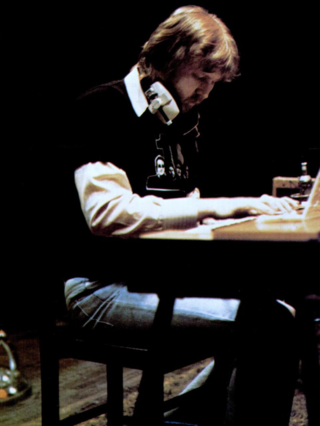
Harry Edward Nilsson III, sometimes credited as Nilsson, was an American singer-songwriter who reached the peak of his success in the early 1970s. His work is characterized by pioneering vocal overdub experiments, a return to the Great American Songbook, and fusions of Caribbean sounds. Nilsson was one of the few major pop-rock recording artists to achieve significant commercial success without performing major public concerts or touring regularly.
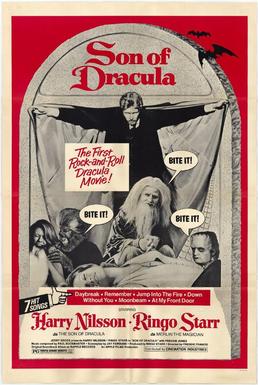
Son of Dracula is a 1974 British musical film directed by Freddie Francis and starring Harry Nilsson and Ringo Starr. It was produced by Starr and released in 1974 by Apple Films. It is also the title of a soundtrack released in conjunction with the film.

Son of Schmilsson is the eighth album by American singer Harry Nilsson.

Encouraging Words is the fifth studio album by American soul musician Billy Preston, released in September 1970 on Apple Records. It was the last of Preston's two albums for the Beatles' Apple label, after which he moved to A&M Records. The album was co-produced by George Harrison and Preston. Harrison's songs "All Things Must Pass" and "My Sweet Lord" were issued here for the first time, two months before his own recordings appeared on his triple album All Things Must Pass.

"Power to the People" is a song written by John Lennon, released as a single in 1971, credited to John Lennon/Plastic Ono Band. It was issued on Apple Records and charted at #6 on the British singles chart, at number 10 on the Cashbox Top 100, and at number 11 on the Billboard Hot 100 The song's first appearance on album was the 1975 compilation Shaved Fish.
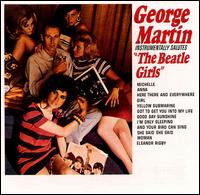
George Martin Instrumentally Salutes "The Beatle Girls" is a 1966 album by George Martin & His Orchestra. It is the third in a series of albums by Martin, the Beatles' producer at the time, that consist of instrumental arrangements of Beatles songs. It was released by United Artists Records on 28 November 1966 in the United States, with the United Kingdom release following on 3 March 1967.
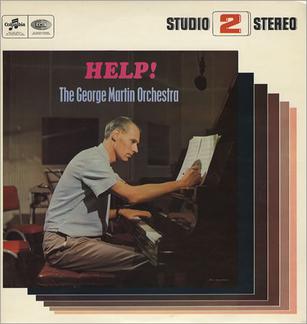
Help! is a 1965 album by the George Martin Orchestra, the second in a series of albums by Martin featuring instrumental arrangements of Beatles songs. United Artists released the LP in the United States on 19 September 1965, and EMI's Columbia Graphophone label released it in the United Kingdom on 19 November. The album consists of Martin's interpretations of songs from the Beatles' own Help! album, which was issued in August 1965.

Wind of Change is the debut studio album by English guitarist and singer Peter Frampton, released in 1972 by A&M. The album features appearances by Ringo Starr, Billy Preston and Klaus Voormann.
"That Is All" is a song by English musician George Harrison released as the final track of his 1973 album Living in the Material World. A slow, heavily orchestrated ballad, it is one of many Harrison love songs that appear to be directed at either a woman or a deity. Harrison wrote and recorded the song during the height of his public devotion to Hinduism; on release, Rolling Stone described its lyrics as "a sort of Hindu In Paradisium".
B.B. King in London is a nineteenth studio album by B.B. King, recorded in London in 1971. He is accompanied by US session musicians and various British rock- and R&B musicians, including Ringo Starr, Alexis Korner and Gary Wright, as well as members of Spooky Tooth and Humble Pie, Greg Ridley, Steve Marriott, and Jerry Shirley.
"You and Me (Babe)" is a song by English musician Ringo Starr, released as the final track on his 1973 album Ringo. Starr's fellow ex-Beatle George Harrison wrote the song along with Mal Evans, the Beatles' longtime aide and a personal assistant to Starr during the making of Ringo. The track serves as a farewell from Starr to his audience in the manner of a show-closing finale, by lyrically referring to the completion of the album. During the extended fadeout, Starr delivers a spoken message in which he thanks the musicians and studio personnel who helped with the recording of Ringo – among them, Harrison, John Lennon and Paul McCartney, and his producer, Richard Perry.

The Tin Man Was a Dreamer is a studio album by English musician Nicky Hopkins, released in 1973 on Columbia Records. While Hopkins had long been well known for his distinctive, melodic style on piano and Wurlitzer electric piano, the album provided a rare opportunity to hear him sing, unlike his earlier solo releases The Revolutionary Piano of Nicky Hopkins and Jamming with Edward! The album was co-produced by Neil Young's regular producer, David Briggs, and featured contributions from George Harrison, Mick Taylor, Klaus Voormann and Hopkins's fellow Rolling Stones sidemen Bobby Keys and Jim Price.
Lon & Derrek Van Eaton were an American vocal and multi-instrumentalist duo from Trenton, New Jersey, consisting of brothers Lon and Derrek Van Eaton. They are best known for their association with the Beatles through the brothers' brief stint on Apple Records, and for their subsequent session work in Los Angeles for producer Richard Perry. As well as recording their own albums, during the 1970s they appeared on releases by artists including George Harrison, Ringo Starr, Harry Nilsson, Carly Simon, Martha Reeves and Art Garfunkel. Beatles biographer Robert Rodriguez describes the Van Eaton brothers as arguably the closest the Apple record label came to delivering on its initial promise of "plucking unknowns from obscurity" and launching them as successful recording artists.
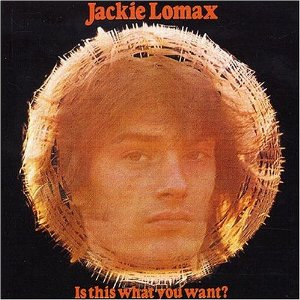
Is This What You Want? is the debut album by English rock and soul singer Jackie Lomax, released in 1969 on the Beatles' Apple record label. It was produced by George Harrison and features contributions from Harrison's Beatles bandmates Paul McCartney and Ringo Starr. The album includes Lomax's debut single for Apple, the Harrison-written "Sour Milk Sea". The US version added "New Day", which was produced by Lomax and released as a non-album single in Britain.
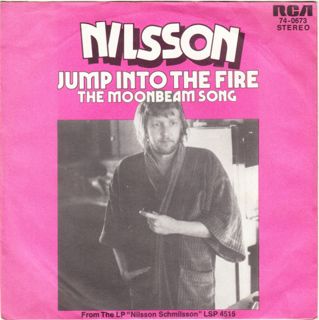
"Jump into the Fire" is a song by American singer-songwriter Harry Nilsson from his 1971 album Nilsson Schmilsson. It was also issued as the album's second single, after "Without You", and peaked at number 27 on America's Billboard Hot 100 chart and number 16 in Canada.

Footprint is the second solo album by American musician Gary Wright, released in 1971 on A&M Records. It contains "Stand for Our Rights", an anthem-like song calling for social unity that was issued as a single in advance of the album. Wright recorded the majority of Footprint in London with a large cast of musicians – including George Harrison, Hugh McCracken, Alan White, Klaus Voormann, Jim Gordon, Jim Keltner and Bobby Keys – many of whom, like Wright, had played on Harrison's All Things Must Pass triple album in 1970. Harrison's contributions included an uncredited role as producer, and serve as an example of his support for Wright during the early stages of Harrison's solo career. The ballad "Love to Survive" is one of three tracks that feature an orchestral arrangement by John Barham.
"Spaceman" is a song written and recorded by the American singer-songwriter Harry Nilsson, released on his 1972 album Son of Schmilsson.

Brother is the debut album by the American pop-rock duo Lon & Derrek Van Eaton. It was released on the Beatles' Apple record label in September 1972 in the United States and February 1973 in Britain. It includes the single "Sweet Music", produced by George Harrison, and was otherwise produced by Klaus Voormann, a friend and longtime associate of the Beatles. On release, the album received favorable reviews from music critics but failed to achieve commercial success. Rolling Stone critic Stephen Holden hailed it as a "staggeringly impressive first album".

"I Wrote a Simple Song" is a song by American soul musician Billy Preston that was first released as the title track to his album of the same name in November 1971. It was written by Preston and his regular collaborator, Joe Greene. The song was also Preston's first single on A&M Records, following the end of his tenure on the Beatles' Apple record label. In the United States, it peaked at number 77 on the Billboard Hot 100. Radio programmers there soon favored the B-side, the instrumental "Outa-Space", which had been Preston's choice for the lead side. "Outa-Space" became a breakthrough US hit for Preston and his first RIAA-certified gold single. The single was released in Britain on January 21, 1972.
Joe Greene is an American gospel and soul singer and songwriter. A male soprano, he was especially active in the late 1960s and the 1970s as a backing vocalist for rock artists seeking to achieve a more polished vocal performance on their recordings. As a songwriter during that time, he frequently collaborated with Billy Preston, co-writing the latter's Grammy-winning 1972 hit "Outa-Space" and other songs.